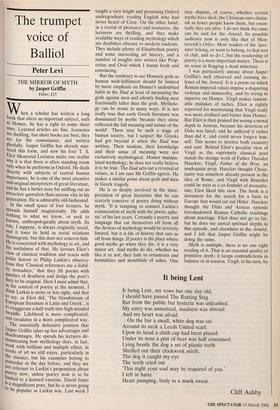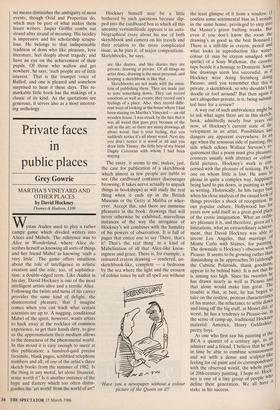The trumpet voice of Balliol
Peter Levi
THE MIRROR OF MYTH by Jasper Griffin
Faber, 15
When a scholar has written a long book that alters an important subject, such as Homer, he has a right to some short ones. Learned articles are fine, footnotes are thrilling, but short books are best; they are for the connoisseur, and written gleefully. Jasper Griffin has already mas- tered this form, and now his four T. S. Eliot Memorial Lectures make one realise Why it is that there is often standing room Only when he performs in Oxford. He deals directly with subjects of central human Inlportance, he is one of the most attentive and original interpreters of great literature, and he has a better nose for sniffing out an attractive quotation than anyone else in his generation. He is admirably old-fashioned. In the small space of four lectures, he Spreads himself magisterially. He adds nothing to what we know, or seek to known, anthropologically about myth. Its role, I suppose, is always originally social, and it loses its hold as social relations disintegrate, but this does not concern him. He is concerned with mythology in art, and the usefulness of that. He favours Eliot's view of classical tradition and reacts with Polite horror to Philip Larkin's observa- tions that 'Classical references are a liabil- ity nowadays,' that they fill poems with Patches of deadness and dodge the poet's duty to be original. Here I must admit that, in.the context of poetry at the moment, I think Larkin is more or less right, and that to say, as Eliot did, 'The bloodstream of European literature is Latin and Greek', is to exaggerate a half-truth into high-minded twaddle. Lifeblood is more complicated, and circulates in a more complicated way. The essentially defensive position that Ja.sper Griffin takes up has advantages and disadvantages. He spends his lectures de- Inonstrating how mythology does, in fact, Work with brilliant and multiple effect, in works of art we still enjoy, particularly in the classics; but his examples belong to Yesterday or the day before, and they are not relevant to Larkin's proposition about P.oetry now, unless poetry now is to be limited to a learned exercise. David Jones 1.8 a magnificent poet, but he is never going ") be popular as Larkin was. Last week I taught a very bright and promising Oxford undergraduate reading English who had never heard of Circe. On the other hand, as a recital of pleasures and resources, the lecturers are thrilling, and they make available ways of reading mythology which are doubtless obscure to modern students. They include plenty of Elizabethan poetry and some interesting art history, and a number of insights into writers like Prop- ertius and Ovid which I found fresh and convincing.
But the tendency to see Homeric gods as human wish-fulfilment should be limited by more emphasis on Homer's undoubted habit in the Iliad at least of measuring the gods against men and silently finding men fractionally taller than the gods. Mytholo- gy can be ironic in many ways. It is not really true that early Greek literature was dominated by myths 'because they alone reflected the full meaning and nature of the world'. There may be such a stage of human society, but I suspect the Greeks had got beyond it when the Iliad was written. Their wisdom, their knowledge and their sense of meaning were not exclusively mythological. Homer manipu- lated mythology; he does not really believe it to be true. The Iliad acts out a reversal of values, as I am sure Mr Griffin agrees. He makes a similar point about gods and men in Greek tragedy.
He is so deeply involved in the inter- pretation of great literature that he can scarcely conceive of poetry doing without myth. 'It is tempting to connect Larkin's renunciation of myth with the poetic apha- sia' of his last years. Certainly a poetry and language that cut themselves off from all the devices of mythology would be severely limited, but it is life or history that cuts us off from things. If poetry is the place where good myths go when they die, it is a very minor art. And myths do die, whether we like it or not; they fade to ornaments and formalities and mouthfuls of ashes. One may dispute, of course, whether certain myths have died; the Christian ones dimin- ish as fewer people know them, but essen- tially they are alive. I do not think the same can be said for the Aeneid. Its possible audience now is only like that of Mon- teverdi's Orfeo. Most readers of the Spec- tator belong, or want to belong, to that sort of club, and so do I, but the readership of poetry is a more important matter. There is no sense in flogging a dead minotaur.
I was particularly uneasy about Jasper Griffin's well observed and cunning de- fence of the Aeneid. It is a poem on which Roman imperial values impose a disgusting violence and immorality, and by trying to improve on Homer, Virgil makes lament- able mistakes of tactics. Eliot is rightly reproved for maintaining that Virgil really was more civilised and better than Homer. But Eliot is then praised for seeing a moral depth in Aeneas, because his desertion of Dido was fated, and he suffered it rather than did it, and could never forgive him- self. This seems to involve both casuistry and cant. Behind Eliot's peculiar view of Virgil as the supremely classical poet stands the strange work of Father Theodor Haecker, Virgil, Father of the West, an inadequate prop. Haecker thought Christ- ianity was somehow already present in the idea of Rome, and Virgil with Benedict could be seen as a co-founder of monastic- ism; Eliot liked this view. The book is a document for the search for a basis to Europe that would cut out Hitler. Haecker thought the Dido and Aeneas episode foreshadowed Roman Catholic teachings about marriage. Eliot does not go so far, but he does see unreal spiritual depths in this episode, and elsewhere in the Aeneid, and I felt that Jasper Griffin might be doing the same.
Myth is multiple, there is no one right reading of it. That is an essential quality of primitive myth; it keeps contradictions in balance or in tension. Virgil, in his turn, by no means diminishes the ambiguity of most events, though Ovid and Propertius do, which may be part of what makes them lesser writers. Jasper Griffin combs out strand after strand of meaning. His lucidity is impressive and his scholarship scrupu- lous. He belongs to that indispensable tradition of dons who like pleasure, love literature, feel deeply about tragedy, and have an eye on the achievement of their pupils. Of those who wallow and get nowhere, he says, 'such people are of little interest.' That is the trumpet voice of Balliol, and one is pleased and somehow surprised to hear it these days. This re- markable little book has the makings of a classic of its kind. As the quotations are generous, it serves also as a most interest- ing anthology.



















































 Previous page
Previous page